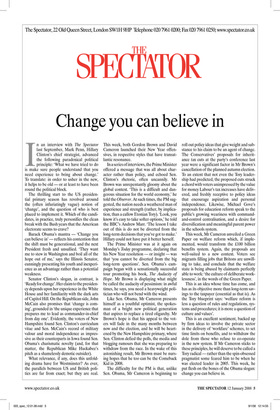Change you can believe in
In an interview with The Spectator last September, Mark Penn, Hillary Clinton’s chief strategist, advanced the following paradoxical political principle: ‘What we have tried to do is make sure people understand that you need experience to bring about change.’ To translate: in order to usher in the new, it helps to be old — or at least to have been round the political block.
The thrilling start to the US presidential primary season has revolved around the (often infuriatingly vague) notion of ‘change’, and the question of who is best placed to implement it. Which of the candidates, in practice, truly personifies the clean break with the Bush years that the American electorate seems to crave?
Barack Obama’s mantra — ‘Change you can believe in’ — reflects his contention that the shift must be generational, and the next President fresh and unsullied. ‘They want me to stew in Washington and boil all of the hope out of me,’ says the Illinois Senator, cunningly presenting his youth and inexperience as an advantage rather than a potential weakness.
Senator Clinton’s slogan, in contrast, is ‘Ready for change’. Her claim to the presidency depends upon her experience in the White House and her familiarity with the dark arts of Capitol Hill. On the Republican side, John McCain also promises that ‘change is coming’, grounded in ‘the unique experience that prepares me to lead as commander-in-chief from day one’. Evidently, the voters of New Hampshire found Sen. Clinton’s curriculum vitae and Sen. McCain’s record of military valour and moral independence as impressive as their counterparts in Iowa found Sen. Obama’s charismatic novelty (and, for that matter, the Republican Mike Huckabee’s pitch as a shamelessly demotic outsider).
What relevance, if any, does this unfolding drama have for Westminster? As ever, the parallels between US and British politics are far from exact; but they are real. This week, both Gordon Brown and David Cameron launched their New Year offensives, in respective styles that have transatlantic resonance.
In a series of interviews, the Prime Minister offered a message that was all about character rather than policy, and echoed Sen. Clinton’s rhetoric, often uncannily. Mr Brown was unrepentantly gloomy about the global context. ‘This is a difficult and dangerous situation for the world economy,’ he told the Observer. At such times, the PM suggested, the nation needs a weathered man of experience and strength (rather, by implication, than a callow Etonian Tory). ‘Look, you know it’s easy to take softer options,’ he told the BBC’s Andrew Marr. ‘The lesson I take out of this is do not be diverted from the long-term decisions that you’ve got to make.’ Hillary could not have put it better herself.
The Prime Minister was at it again on Monday’s Today programme, declaring that his New Year resolution — or insight — was that ‘you cannot be diverted from the big long-term questions’. Sen. Obama’s campaign began with a sensationally successful tour promoting his book, The Audacity of Hope. Mr Brown is displaying what might be called the audacity of pessimism: in awful times, he says, you need a heavyweight politician who will not bend with the wind.
Like Sen. Obama, Mr Cameron presents himself as a youthful optimist, the spokesman of a bright new political generation that aspires to replace a tired oligarchy. Mr Brown’s hope is that his appeal to the voters will fade in the many months between now and the election, and he will be heartened by the New Hampshire primary, where Sen. Clinton defied the polls, the media and blogging rumours that she was preparing to withdraw from the race. In the wake of this astonishing result, Mr Brown must be nursing hopes that he too can be the Comeback Kid in 2008.
The difficulty for the PM is that, unlike Sen. Obama, Mr Cameron is beginning to roll out policy ideas that give weight and substance to his claim to be an agent of change. The Conservatives’ proposals for inheritance tax cuts at the party’s conference last year were a significant factor in Mr Brown’s cancellation of the planned autumn election. To an extent that not even the Tory leadership had predicted, the proposed cuts struck a chord with voters unimpressed by the value for money Labour’s tax increases have delivered, and freshly receptive to policy ideas that encourage aspiration and personal independence. Likewise, Michael Gove’s proposals for education reform speak to the public’s growing weariness with commandand-control centralisation, and a desire for diversification and meaningful parent power in the schools system.
This week, Mr Cameron unveiled a Green Paper on welfare reform which, if implemented, would transform the £100 billion benefits system. Again, the proposals are well-suited to a new context. Voters see migrants filling jobs that Britons are unwilling to take, and conclude that the welfare state is being abused by claimants perfectly able to work: ‘the culture of deliberate worklessness’, in the words of the Green Paper.
This is an idea whose time has come, and has as its objective more than long-term savings to the taxpayer (essential as that is). As the Tory blueprint says: ‘welfare reform is less a question of rules and regulations, systems and procedures; it is more a question of culture and values’.
This is an excellent sentiment, backed up by firm ideas to involve the private sector in the delivery of ‘workfare’ schemes, to set time limits on benefits, and to withdraw the dole from those who refuse to co-operate in the new system. If Mr Cameron sticks to these principles, he will deserve to be called a Tory radical — rather than the spin-obsessed pragmatist some feared him to be when he was elected leader in 2005. This week, he put flesh on the bones of the Obama slogan: change you can believe in.


























































 Previous page
Previous page